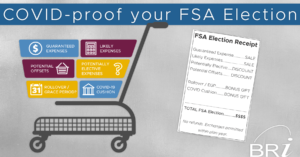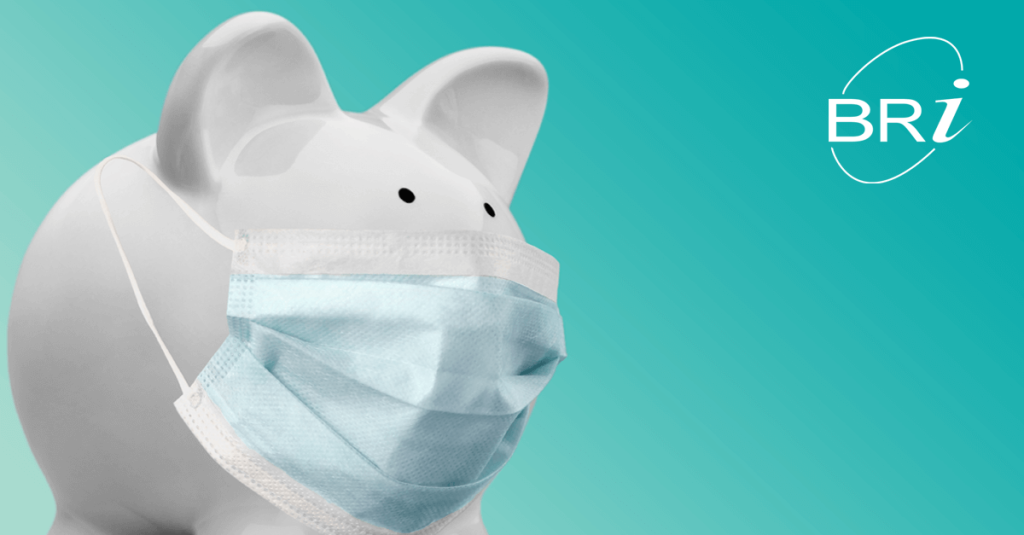Flexible Spending Accounts (FSAs) have always relied on a certain level of predictability when it comes time to estimating your election. But, with a year like 2020, it might take just a few extra steps to COVID-proof your election for 2021.
1. Estimate your Guaranteed Expenses
We all have certain unavoidable medical expenses. These are the ones that are inevitable, regardless of what is going on around us. While these may vary for each person, common areas to consider include:
- Prescriptions
- Routine Care
- Management of Chronic Conditions
- Medical Goods & Supplies
2. Determine your Likely Expenses
This is where COVID starts to mess things up a little bit. Historically, you were able to plan for many elective procedures and fund your FSA accordingly. When doctors offices canceled elective procedures and dental offices closed, people that funded their FSA with the intention of using it for these expenses, likely found themselves concerned or scrabbling. In a COVID environment, it is best to separate out those “likely expenses” from “potentially elective procedures”. This will allow you to have a clearer picture of your known expenses
What are Likely Expenses?
- Required dental work. Emergency dental work and procedures largely continued to occur even during the height of the pandemic and closures. As a general rule of thumb, if your dental needs are causing you pain, you can be confident that you will be able to use your dental funds.
- Glasses and/or contact lenses. You need to see don’t you? Even if optical centers are closed, your contacts and glasses purchases are safe bet for reimbursement from an FSA.

What are Potentially Elective Procedures?
- Non-emergency dental work. Dental offices continue to operate with limited capacity. This may affect your access to dental cleanings, surface fillings, crowns and the like, which are non-emergency.
- Lasik eye surgery and other non-emergency procedures. When it comes to non-emergency procedures, it is best to understand what the facility’s current COVID-19 practices are. What will trigger them to close? What are their capacity limits? Do you have a confirmed appointment for a procedure? What is the risk that your procedure is delayed? It is best to factor in all these items to determine if you are going to set-aside funds in your FSA for this expense.
3. Identify Potential Offsets
If the “potentially elective procedures” are your at risk expenses, think of your “potential offsets” as the back-up plan. If a procedure or expense is delayed or canceled, these are the items you likely will still need and can purchase to avoid any potential loss of funds.
Think about over-the-counter drugs and medicines, medical supplies, feminine care products. According to SIGIS, there are over 120,000 unique eligible items. FSA Store makes it easy to find and purchase eligible items.
4. Create a COVID-Cushion in Your Election
Without a vaccine, we are all at increased risk for contracting COVID-19. As companies and schools attempt to control the spread of COVID-19, they are often implementing a no-tolerance policy when it comes to any form of sickness. In many cases, these employment and education system policies are likely to drive people to seek medical care at higher rates than they once did.
Current metrics indicate more than 1 in 3 people have been tested for COVID and that trend is likely to increase in the coming months. While the cost of a COVID test is often paid for, doctor’s visits and other health care needs still often have out-of-pocket expenses.
5. Understand what happens to plan funds at the end of the plan year
- Rollover
- Forfeiture
- Extended Grace Period
COVID has changed the (normally dependable) way plan funds are treated at the end of the plan year. While all three of the usual options are still available, the details have grown more complicated in recent months due to new legislation.
One step the administration took was to offer relief around the treatment of FSA funds. The relief included four main changes. Additionally, the IRS and Department of Labor passed a notice extending deadlines for COBRA and health plans, including an extension of the run-out period for FSA and HRA plans.
Looking Ahead
While there may be no perfect way to COVID-proof your election in 2021, you can start with one of the items above to minimize your risk in an already uncertain season. To receive more updates on how COVID-19 is affecting pre-tax plans, subscribe to our newsletter, the BRiPulse.



